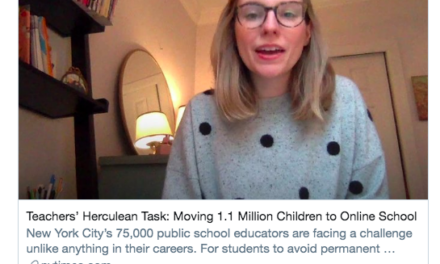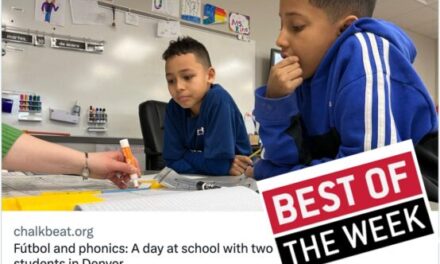📢 “Were your ears burning?,” EdWeek’s Alyson Klein asked me earlier this week. “I just got off a call with a teacher who loves your Twitter feed and loves that you ‘hold reporters’ feet to the fire.'” Thanks for the high praise, Alyson! 📢
In this week’s newsletter: The midterms are just days away, with unusual attention focused on school board races in some places. Episode 4 of Sold a Story has dropped, taking aim at literacy superstar Lucy Calkins. A reporter shares how to tell a solutions story about teacher diversity without letting it turn into a puff piece. And Chalkbeat offers “no comment” on plagiarism by one of its bureau chiefs.
MIDTERM MANIA
The big story of the week, according to us
The big story of the week is the looming midterms, which will affect the composition of school boards, state laws covering schools, and the national conversation around “parents’ rights.” Education doesn’t always play such a big role in elections, and to be fair, it’s not a top priority for voters this time around either. (“Schools and CRT are so last year,” quipped Slate’s Jim Newell.) But school board races, book complaints, and declining test scores have put a brighter spotlight on education than usual. The New Yorker even has a big piece (nearly 9,000 words) on Moms for Liberty. On the other side of the political spectrum, The Washington Post reports that “Mama Bears” are working to help LGBTQ kids and do the impossible — change people’s minds.
A sampling of the coverage:
🔊 How education culture wars have shaped the midterms (Vox)
🔊 Why School Board Seats May Be the Hottest Races on Your Midterm Ballot (Time)
🔊 The Right-Wing Mothers Fuelling the School-Board Wars (New Yorker)
🔊 More parents motivated to vote in midterms, poll finds (The 74)
🔊 How national politics are changing Minnesota’s school board elections (MPR)
🔊 This Texas Election Could Change School Lessons Nationwide (Texas Monthly)
🔊 The ‘Parental Rights’ Movement Has Its Sights On This OC School Board (LAist)
🔊 PACs Get Attention, but Teachers Unions Still Dominate School Board Elections (The 74)
Other big stories this week: While most colleges and universities won’t be directly affected, a Supreme Court decision over affirmative action could send a strong message and even have indirect effects on K-12 integration efforts. For more on the case, follow GBH higher ed reporter Kirk Carapezza. Also, the Parkland school shooter was formally sentenced to life in prison. Before his sentencing, victims and their families had the chance to confront him in court. And inflation has come for school nutrition programs.

CLASSROOM INNOVATION
The best education journalism of the week, according to us
🏆 BEST: The best story of the week is Holly Korbey’s There’s a Reading Miracle Happening Down in Mississippi in Ed Post. Amid the flurry of recent stories on reading instruction, here’s another that doesn’t disappoint. Korbey dives into what’s been dubbed the “Mississippi Miracle” — a fast upward trajectory in reading scores after coming in dead last. Korbey describes exactly what schools have done — training teachers in the “science of reading,” using “choral reading,” reorganizing the state ed department — as well as the impact it has had. Some schools, like one she profiled in Jackson, still have a long way to go, but the improvements are visible through her reporting. The parent of one third grader there says her son still skips over challenging passages, but he has developed a love of reading as well as an ear for grammar. “He’s even started correcting me, saying ‘Mom, you can’t use that word to start that sentence,’” the parent said.
🏆 RUNNER-UP: This week’s runner-up is Neal Morton’s In one giant classroom, four teachers manage 135 kids – and love it for the Hechinger Report and AP. Morton is on fire lately, and here’s another example. Focusing on a Mesa, Arizona, experiment in team teaching, in which teachers “dissolve the walls” separating classrooms and subjects, Morton is honest about his impressions: It looks like chaos, but early data shows some promise, particularly in this post-pandemic climate. Borrowing from “team teaching” techniques pioneered in the 1960s, it has boosted teacher morale and improved on-time course completion, studies say, but the method is not for everyone. Morton highlights what’s working in Mesa, while also pointing out its limitations. Nonetheless, he writes with enough knowledge and detail that other districts (and reporters) may learn a thing or two. It’s solutions journalism at its finest.
BONUS:
🏆 The Pandemic Generation Goes to College. It Has Not Been Easy. (New York Times)
🏆 CDC: 3 in 4 high schoolers faced potential trauma during pandemic (K-12 Dive)
🏆 Denver district’s ban of outspoken parent raises questions about boundaries of criticism (Chalkbeat CO)
🏆 Disabled kids fighting school placements ‘almost always lose,’ Va. suit says (Washington Post)
🏆 CPS staffing grows even as enrollment drops (WBEZ Chicago)
🏆 911 recordings reveal fear and urgency of those trapped in Uvalde (Texas Tribune/ProPublica)
SOLUTIONS ≠ FLUFF
New commentary from The Grade
Search for the unexpected. Highlight first-hand observations. Stick to the evidence. Compare, compare, compare. These are some of veteran education reporter Kate Rix’s helpful tips about writing solutions stories that don’t become puff pieces.
“I focused on the evidence, not the district’s aspirations,” she writes about a Phoenix-area teacher diversity story she wrote for the Hechinger Report. “I focused on first-hand observations rather than district quotes.”
See more coverage of school innovation and promising efforts in the section below.
READING GAINS
Promising innovations & signs of progress
💡 South Carolina limited pandemic learning losses better than most states. And English language learners in Chicago, LA, Albuquerque, and Fort Worth, as well as Black students in Texas, made strides in their reading scores. (Post and Courier, The 74, Dallas Morning News)
💡 A new law in Oklahoma was designed to give parents more choice by allowing students to transfer schools. So far it’s working: the majority of transfer requests this year have been granted. (KOSU)
💡 Under a new initiative to end youth homelessness, Walla Walla, Wash., cut its homeless population of young people in half since last year. Three other cities didn’t do as well. (Seattle Times)
See also Kate Rix’s new column (above) about how to write solutions stories without letting them turn into puff pieces.
Follow me at @alexanderrusso for thought-provoking commentary all day, every day.

PEOPLE, JOBS
Who’s doing what, going where
Above: Hard-working KPCC/LAist education reporter Kyle Stokes, left, interviewed all four LAUSD school board candidates and rounded up their views on issues including charter schools, police in schools, and enrollment.
🔥 Transparency and trust: On Monday, Chalkbeat EIC Nicole Avery Nichols apologized to readers for two dozen stories from the Philadelphia bureau that “did not comply with our editorial standards” and pledged to be transparent about the process. All stories were written by the bureau chief. Asked follow-up questions, the organization responded that it would have no further comment.
🔥 Awards: Congrats to This American Life’s “Talking While Black,” Fox Baltimore’s “Failure Factory,” and Gimlet Media’s “Surviving St. Michael’s,” which are duPont-Columbia award finalists. And belated congrats to Watershed Voice, which won a LION Award for its “in-depth look into how a school-linked community adolescent health center is working to remove barriers between students and mental health services in Three Rivers, Michigan.” Chalkbeat also took home the public service award for a medium-sized publication.
🔥 Job openings: Indiana Public Broadcasting News is hiring a statewide education reporter. The Atlanta Journal-Constitution is hiring a K-12 education reporter. Idaho Education News is hiring an education reporter. And the deadline is approaching (Nov. 7) to apply for the audience engagement editor role at the Hechinger Report.
🔥 Career changes: Burned out and worried about school shootings, Carly Flandro left teaching to become an education reporter for Idaho Education News.

PODCASTS, RESOURCES
What’s happening and new research
Above: Amnesty might be something politicians or parents would be interested in, but it isn’t in a journalist’s job description.
⏰ Podcasts: Episode 4 of APM Reports’ Sold a Story is out, and this one questions why the celebrated literacy leader Lucy Calkins didn’t know the reading strategies she promoted were not backed up by scientific research. One hint: Calkins’ casual reference to monogrammed towels.
⏰ Appearances: WFAE’s Ann Doss Helms was on the station’s Inside Politics podcast to talk about the politicization of school board races in Charlotte-Mecklenburg. The New York Times Brian Rosenthal was on EWA Radio talking about his investigation with Eliza Shapiro into New York Hasidic schools. The 74’s Mark Keierleber kicked off the National Summit on K-12 School Safety and Security with a fireside chat.
⏰ Resources: A report from the U.S. Government Accountability Office showed that from 2018-2021, students lost between three days and three weeks of learning every time there was a cyberattack on a school or district. The Education Recovery Scorecard, a project by Harvard and Stanford researchers, uses national and state test scores to measure and compare learning loss at districts across the country.
THE KICKER

In a podcast about a podcast, EdSurge delves into The Bell’s Miseducation, an investigative podcast by and for students that catapulted to become one of the top podcasts in the country.
That’s all, folks. Thanks for reading!
Reply to this email to send us questions, comments or tips. Know someone else who should be reading Best of the Week? Send them this link to sign up.
Using Feedly or FlipBoard or any other kind of news reader? You can subscribe to The Grade’s “feed” by plugging in this web address: http://www.kappanonline.org/category/the-grade/feed/.
Read more about The Grade here. You can read all the back issues of The Grade’s newsletter, Best of the Week, here.
By Alexander Russo with additional writing from Colleen Connolly.
ABOUT THE AUTHOR

Alexander Russo
Alexander Russo is founder and editor of The Grade, an award-winning effort to help improve media coverage of education issues. He’s also a Spencer Education Journalism Fellowship winner and a book author. You can reach him at @alexanderrusso.
Visit their website at: https://the-grade.org/















